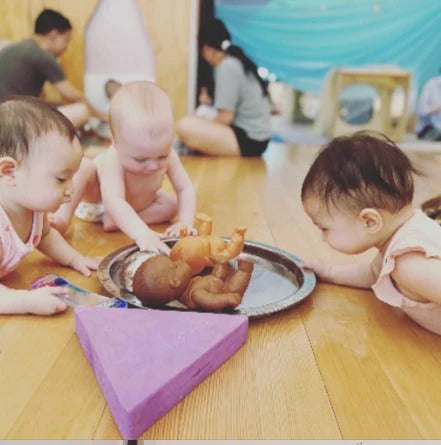Play Therapy and Learning Through Play with Anna Bardi

Anna Bardi, a Canadian Certified Counsellor, has been in the field for over 18 years, providing counselling and Synergetic Play Therapy as part of her practice with children and families.
Why Play?
Play is an essential part of early learning through sensory development and integration. In order to learn something through memorization it takes about 400 repetitions to create a synapse in our brain, but if we do it through play it takes only 10-20.
Through play, kids learn. They learn about the world, social skills and empathy. Attachment building in the infant stage is essential for a child to thrive and learn. They live primarily in the right brain, which governs the emotions and creativity. The left brain is used for logic, language development, organizing and structuring, which comes a little later. Our brains develop from the back, up and forward. Starting from the brain stem (reptilian brain) and ending with the pre-frontal cortex at around age 25-28. As babies are using primarily their right brain, learning through play is what is natural. 0-2 years is when language is starting to develop, at around 3-4 months you'll begin to hear imitation, they will pick up on our facial expressions; this is when neurons are really starting to develop through connection!
An important conversation Anna will have with parents and caregivers is around expectations. Parents may expect certain behaviours at certain times, but remember how long it takes that pre-frontal cortex to develop! A child's brain development may not be at the point where we can reasonably expect certain behaviours.
1-4 year olds are relying on the brain stem for how to behave and also on their emotions. They are expressing different feelings, including frustration, and cannot always do it with words. They are often not able to articulate their emotions and so will express them in other behaviours. By 3-6 years old, their brains are developing to the point where they are beginning to be able to use some logic and planning. They can begin to understand consequences, the concept of time and some other abstract concepts.
When we're looking at play therapy it's important that we always view things from a developmental perspective. What are they are capable of doing, how much capacity there is in any one moment? One of the things Anna says she does in her practice is not only put words to the experience a child is having in their play, but also be able to co-regulate with them, using herself as a thermometer to gauge what's going on; to be able to articulate that and also show them lots of different tools and ways to access their nervous system. In infants, co-regulation is so important because self-regulation is not possible in many instances and it continues to be part of the journey as they grow.
An experiential example of co-regulation:
Anna: "Imagine I have a platter of lemons in front of me and I cut a lemon and take a bite. What happened to you when I pretended to taste the lemon?"
Parents: "I tasted the lemon", "I imagined sour"
Anna: "These are mirror neurons in your brain experiencing what I was only pretending to experience!"
So, co-regulation is about lending children our nervous system, our fully developed brain. If they're having a big feeling and we sit next to them and take a breath, our nervous system impacts their nervous system. Sometimes we also can become dysregulated when they are! We may have to remove ourselves or change our environment slightly so that we can approach the moment from a more regulated state. This can be through words, touch, breath or just proximity. In our interactions we impact each other.
Also, realize that we cannot be regulated every moment of every day! We will move from being hyper-aroused (our heart rate may be faster, we may feel stressed), regulated and hypo-aroused (tired, not as responsive). But research has shown that if we are in an engaged, regulated state even 30% of the time that we are with our babies we are doing ok! There is so much pressure to be perfectly in tune with your baby all the time and you can just let that go. And when you don't get it right there is always the chance for repair. So much learning comes from the attempts to repair interactions that didn't go the way you would have liked them to.
For those interested specifically in how a therapy session might work, during a therapy session, Anna says, she will work with not only the child, but with the family. They will start with a check in, then either a directive or non-directive play experience and then end the session with the child making a wish for themselves or someone else.
At home, the activities that you can do with your infant down on the floor, playing at their level, with interactions back and forth are all the ways that you and other caregivers can build those important connections.
Contributed by Shauna Farrell
